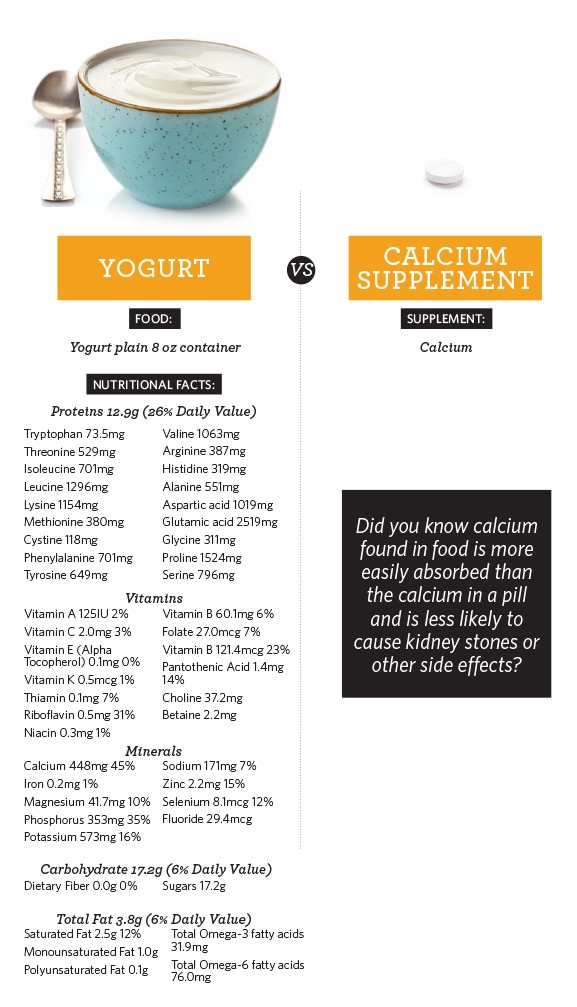Calcium is the most abundant mineral in your body, and one of the most important minerals for optimizing your overall health and performance. But should you take calcium supplements to ensure that you’re getting enough of the mineral responsible for bone health?
Here’s what you need to keep in mind when considering calcium in whole food or supplement form.
What are the health benefits of calcium?
You probably know that calcium is critical for helping keep your bones strong. But that’s not the only reason it’s important. Calcium also:
– Maintains strong bones and teeth
– Regulates heart and muscle function
– Potentially protects against diabetes and certain cancers
If you’re low on calcium, your body will actually pull the stored calcium from your bones and teeth in order to maintain the right balance—and that can lead to potential health problems.
How much calcium do athletes need to stay healthy?
The Food and Drug Administration recommends that teens consume 1300 mg of calcium per day, while adults absorb roughly 1000 mg of calcium per day. Unfortunately, teens often don’t have enough calcium in their diets, due to their young body’s higher demand and tendency to skip the necessary leafy greens or dairy products.
Severe calcium deficiency—hypocalcemia—can result in muscle cramps, weakness, and an irregular heartbeat, so it’s important to make sure you’re getting enough calcium on a daily basis. Low calcium levels can also increase your risk for osteoporosis (bone loss), which can already be a problem for athletes, particularly female athletes who are underweight, overtraining, or struggling with an eating disorder.
However, having too much calcium—over 1500 mg—can cause stomach pain and diarrhea.
Can athletes get enough calcium through food alone?
Unless there is a diagnosed deficiency (and you’ve identified the reason for it), athletes can typically skip the supplement and get all the calcium they need from food alone. Dairy is the easiest place to get your calcium: 8 ounces of plain yogurt–a typical serving size–contains 45 percent of your daily calcium needs, with 449 mg in each cup. Beyond just calcium, a cup of plain yogurt has 12.9 grams of protein and is the perfect base for building a nutrient-dense parfait. Outside of dairy, leafy greens are also great sources for calcium, as well as fortified soy milks, cereals, almonds, and small fish (eaten with the bones-in, like sardines).
Calcium absorption can be halted by certain foods, however. Eating a lot of sodium-rich foods or a high-protein diet may actually limit your body’s ability to absorb calcium. On the other hand, having adequate amounts of vitamin D in your diet and/or through sun exposure will help your body absorb the mineral.

Is it better to get calcium from a supplement?
All supplements come with some amount of risk (see below), so in the vast majority of cases, it’s better to skip the supplement and go with a food-first approach to fueling for sport. More specifically, calcium found in food is more easily absorbed than the calcium in a pill (and is less likely to cause kidney stones or other side effects). And because it’s found in plenty of healthy, budget-friendly foods that are appropriate for all dietary needs, athletes shouldn’t have trouble getting enough calcium through food. If athletes use supplements despite the risks, USADA recommends they have been certified by a third-party program that tests for substances prohibited in sport.
Why are supplements risky in general?
The FDA does not analyze the safety, efficacy, or label accuracy of supplements before they are sold to consumers. Manufacturers may misidentify prohibited substances on labels, or they may leave out the prohibited substances from labels altogether. In some cases, dietary supplements with prohibited ingredients have remained on shelves for years despite FDA warnings and recall efforts.
No organization can guarantee the contents or safety of any dietary supplement. If a product claims to be “FDA Approved,” “WADA Approved,” or “USADA Approved,” it isn’t. Furthermore, researchers have found that many supplements contain things that aren’t on the label. In 2012, Rexall Pharmacy had to recall a calcium supplement because the supplement in the bottle wasn’t calcium at all–it was the brand’s glucosamine chondroitin.
At the end of the day, athletes always assume some risk of testing positive for prohibited substances when they use supplements.
Read more Spirit of Sport blog posts



